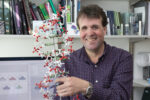

A major focus of the lab is understanding the links between replication and mutagenesis (1‑4). Extrachromosomal DNA (ecDNA) circles are present in a substantial proportion of cancers and frequently harbour oncogenes that drive tumour proliferation (5). The mechanisms governing their replication, and the extent to which this mirrors replication of the corresponding chromosomal loci, remain poorly understood. In addition to self-maintenance, ecDNAs can reintegrate into the host genome, often forming tandem arrays known as homogenously staining regions (HSRs). Such reintegration events have the potential to disrupt chromosome architecture, yet the molecular processes underlying this transition remain unclear.
Our recent work shows that ecDNA replication is disorganised both in the location of DNA synthesis initiation and in its timing during S phase (6). Replication on ecDNA also appears to be more fragile, with increased likelihood of replication fork stalling. How these stalled forks are rescued on ecDNA is unknown, and whether the underlying mechanisms are linked to ecDNA reintegration is an open question.
This project will employ established ecDNA-containing cancer cell line models alongside synthetic ecDNA constructs. Using CRISPR-based genetic perturbations in combination with high-resolution replication mapping, we will dissect the molecular mechanisms that sustain ecDNA replication and examine how these processes interface with pathways leading to reintegration. Our ultimate aim is to clarify the balance between ecDNA maintenance and reintegration, understand how this balance shapes genome architecture and tumour evolution and potentially learn how to harness ecDNA integration for genome engineering.
References
DNA polymerase stalling at structured DNA constrains the expansion of short tandem repeats
Genome Biology 21(1): (2020)
Determination of human DNA replication origin position and efficiency reveals principles of initiation zone organisation.
Nucleic Acids Res 50(13): 7436-7450 (2022)
DNA replication initiation shapes the mutational landscape and expression of the human genome.
Sci Adv 8(45): eadd3686 (2022)
DNA replication initiation drives focal mutagenesis and rearrangements in human cancers
Nature Communications 15(1): (2024)
Extrachromosomal DNA in cancer.
Nat Rev Cancer 24(4): 261-273 (2024)
ecDNA replication is disorganized and vulnerable to replication stress.
Nucleic Acids Res 53(14): (2025)